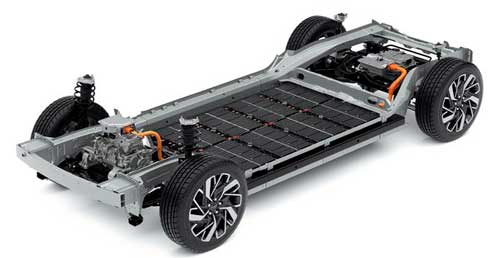Everything You Need to Know About Tyres for Electric Cars
The electric vehicle market continues to grow, and this technology is becoming an increasingly preferred alternative for consumers. Today, more than one in seven cars sold is electric or hybrid.
With this renewal of the automotive market, new questions arise, especially when it comes to tyres.
Tyres for electric or hybrid cars face new challenges, and manufacturers are constantly improving their manufacturing processes. Tyres in general, but more specifically for these cars, play an important role from both a safety and performance perspective.
Even if it is not obvious at first glance, tyres for these cars are designed differently from conventional tyres.
"EV" tyres are specially designed to meet the specific requirements of these vehicles. The structure and rubber compound are often different from a tyre without the "EV" marking.

The Structure of a Tyre for Electric Cars:
These tyres share similarities in their structure, notably with a carcass, a belt, and a tread.
However, electric vehicles generally have a higher mass due to the batteries, which influences the design of the tyres.
EV tyres have an internal structure optimised to reduce rolling resistance. The less rolling resistance there is, the more range an electric or hybrid vehicle will have. By choosing a tyre with the EV specification, you can travel more kilometres on a single charge of your vehicle.
The weight of the batteries is also taken into account by the various manufacturers when designing the tyres. Indeed, these vehicles are often much heavier than their thermal versions. This additional load is directly supported by the tyres. The carcass is specially designed to withstand this additional constraint.
Torque, Grip, and Noise of Electric Car Tyres
Electric vehicles generally have more torque than a thermal vehicle, which is why manufacturers modify the rubber compound of the tyre to provide more grip than a conventional tyre while maintaining its longevity.
Noise is also taken into account by the manufacturer when designing EV tyres, as the cabin is much quieter, the noise generated by the tyre is of great importance. By adjusting the rubber components, manufacturers manage to make the tyres less noisy.
Frequently Asked Questions - Tyres for Electric Cars
Do tyres for electric cars have the same lifespan as conventional tyres?
Yes, tyres for electric vehicles have a similar lifespan to conventional tyres. However, be careful with accelerations. The car being heavier and having more torque, if you do not moderate your accelerations, premature wear of your tyre may occur.
Are all tyres compatible with electric vehicles?
Tyres specially designed for electric vehicles can offer specific characteristics, but it is possible to use all types of tyres as long as they meet the recommended size, load, and speed specifications.
Are tyres for electric cars more expensive than conventional tyres?
No, EV tyres are offered at equivalent prices. We do our best to offer you tyres at the best price all year round.
Do tyres for electric cars have specific markings?
Yes, tyres intended for electric cars may have specific markings to differentiate them from conventional tyres. This marking can vary depending on the tyre manufacturers, but it aims to indicate that the tyre is specially designed to meet the needs of the vehicles.
Here are some markings that can be found on tyres for electric cars:
- Marking "EV": Some tyre manufacturers use the term "EV" (for Electric Vehicle) in the tyre model designation. For example, you might find a tyre named "Bridgestone Turanza EV" or "EV" explicitly indicating that it is suitable for electric vehicles.
- Marking "T0" and "T1" for the original equipment of Tesla.
- Marking "NF0", "NF1", "NF2"… for the electric Porsche Taycan.
- Commercial name "iON" for Hankook tyres.
- And many more...
Tyres are essential components to ensure the performance and safety of electric vehicles. Their manufacture involves material choices, specific rubber compounds, and reinforcement techniques adapted to the needs.
By adopting EV tyres specially designed for these cars, drivers can fully benefit from the advantages of this new technology.


